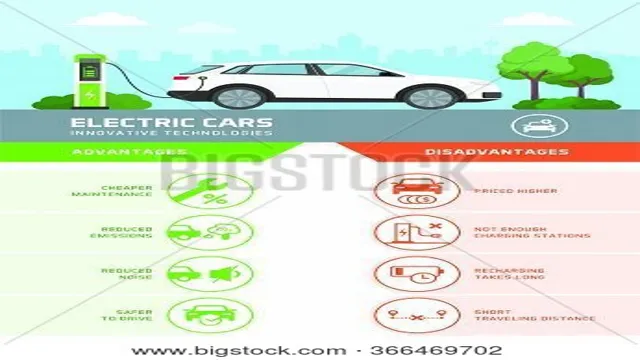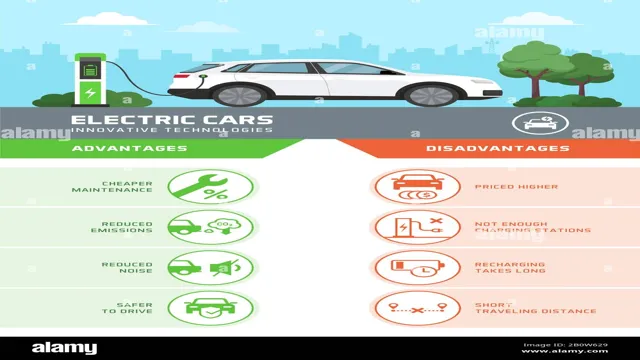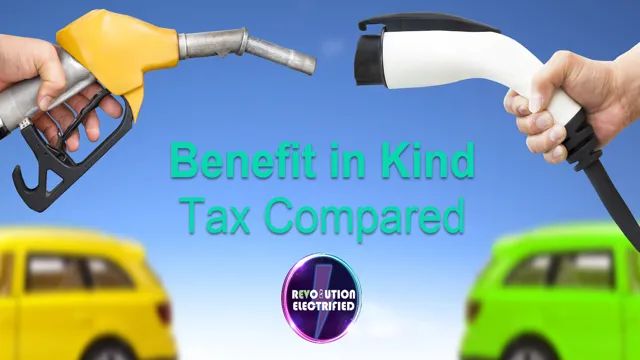The Shocking Truth About Electric Cars: Pros and Cons to Consider
Electric cars, also known as electric vehicles (EVs), are becoming increasingly popular as people search for more environmentally friendly alternatives to traditional gasoline-powered cars. With their eco-friendly properties and sleek designs, EVs offer numerous benefits, including reduced carbon emissions and lower fuel costs. However, as with any technology, there are also some drawbacks to consider, including higher upfront costs and a limited driving range.
In this blog, we’ll explore both the benefits and disadvantages of electric cars to help you make an informed decision on whether an EV is right for you.
Advantages
When it comes to electric cars, there are several benefits to consider. For one, they are much more environmentally friendly than traditional gasoline-powered cars. Electric cars produce zero emissions and help to reduce air pollution.
Additionally, they can save drivers money in the long run. Electric cars have lower operating costs and require less maintenance, meaning that they can be more cost-effective in the long term. On the other hand, there are also some disadvantages to consider.
Electric cars can have a limited range and may require more frequent recharging than traditional cars. Additionally, they can be more expensive upfront than traditional cars, which can be a drawback for some buyers. However, as technology continues to improve, electric cars are becoming more practical and affordable, and they offer a range of benefits for drivers looking to reduce their environmental footprint.
Environmental Impact
When it comes to the environmental impact of clean energy sources, the advantages are numerous. First and foremost, renewable energy sources such as wind, solar, and hydroelectric power produce little to no greenhouse gas emissions, which in turn helps to reduce the overall carbon footprint of energy production. In addition, the use of clean energy sources reduces the dependence on finite resources such as oil and natural gas, which are both non-renewable and can contribute to environmental degradation.
Furthermore, the development of clean energy technologies spurs job creation and can help to stimulate local economies. From reducing air pollution to mitigating the effects of climate change, the advantages of clean energy sources are clear. By transitioning to clean energy, not only can we protect the planet for future generations, but we can also create a more sustainable and prosperous world for all.

Lower Operating Costs
Lower operating costs are one of the biggest advantages for businesses looking to improve their bottom line. By reducing expenses, companies can free up cash flow and invest in growth opportunities. There are a variety of strategies for lowering operating costs, including reducing energy consumption, streamlining processes, and outsourcing certain functions.
Many companies are also embracing new digital tools and technologies to automate tasks and improve efficiency. By implementing these measures, businesses can save money on labor costs, reduce waste, and increase productivity. Ultimately, lower operating costs can help companies compete more effectively in a crowded marketplace and achieve long-term success.
Quiet and Smooth Driving
One of the significant advantages of driving a car with a quieter and smoother engine is the decreased level of noise pollution. Noise pollution from highways and busy roads can have detrimental effects on our health, including stress, hearing loss, and disturbed sleep. A quieter ride will not only help with reducing noise pollution but also make the drive more enjoyable and comfortable for both driver and passengers.
Additionally, smoother driving can help with fuel economy and reduce wear and tear on the car’s mechanical components. It can also offer a better driving experience with less vibration, making the ride smoother and more relaxing. Overall, choosing a car with a quiet and smooth driving experience can offer significant benefits to your health, the environment, and your overall driving experience.
So, next time you’re considering purchasing a car, keep this advantage in mind as it can make a significant difference.
Disadvantages
While electric cars have many benefits, there are also some notable disadvantages. One of the biggest disadvantages of electric cars is their limited driving range. Most electric vehicles can only travel up to 100-200 miles on a single charge, which can be a problem for drivers who regularly travel long distances.
Additionally, it can be difficult to find reliable charging stations, which can make long trips even more challenging. Another disadvantage of electric cars is their higher upfront cost. While the cost of electric vehicles has decreased in recent years, they are still generally more expensive to purchase than traditional gas-powered cars.
Finally, electric cars may not be as practical for those who live in apartment buildings or other areas where it may be difficult to install a charging station. Despite these disadvantages, however, electric vehicles are becoming increasingly popular as more people recognize their benefits and as infrastructure for charging stations continues to improve.
Limited Range and Charging Infrastructure
One of the big disadvantages of electric vehicles is their limited range and limited charging infrastructure. Electric cars generally have a lower range than gas-powered cars, which means they need to be charged more frequently. Even with a full charge, EVs typically can’t travel as far as gas-powered cars.
Additionally, finding charging stations can be a challenge, especially in some areas of the country. This lack of charging options can cause “range anxiety” among EV drivers, particularly when traveling long distances. This can leave drivers feeling stressed and unsure if they will make it to their destination without running out of power.
As the world continues to adapt to the shift towards more environmentally-friendly vehicles, it is expected that more charging infrastructure will be put in place to ease these issues.
Long Charging Time
Long charging times for electronic devices can be a real nuisance. Waiting around for hours on end for your phone, tablet, or laptop to charge up before use can be quite frustrating. One disadvantage of this is the inconvenience it presents to users who need their devices to be quickly charged up for important tasks.
For instance, imagine you are planning to go out, but your phone is almost drained and needs to be charged first. With long charging times, this could take several hours, leaving you stranded with no means of communication. This can be quite distressing, particularly in emergency situations where time is of the essence.
Long charging times can also be a problem for those who travel frequently and need to charge their electronics on the go. Lugging around heavy chargers and searching for power outlets can be a hassle, particularly if you are in an unfamiliar location. In essence, while the convenience of electronic devices cannot be overstated, long charging times remain a significant disadvantage and a problem that needs to be addressed.
Higher Upfront Cost
When it comes to implementing sustainable practices, one of the main disadvantages is the higher upfront cost. While choosing eco-friendly options such as energy-efficient appliances and renewable energy sources may save money in the long run, the initial investment can be intimidating. For instance, installing solar panels can require a significant amount of money at the start, which may be discouraging for some homeowners.
However, it is important to consider the long-term benefits, both for the environment and for your wallet. In the end, reducing your carbon footprint can lead to lower energy bills, tax credits, and potentially increased property value. It is essential to weigh the costs and benefits of sustainable practices to make informed decisions that align with your values and budget.
Conclusion
In conclusion, electric cars have undeniable benefits when it comes to reducing carbon emissions and improving air quality. They offer smoother and quieter rides, require less maintenance, and can save drivers money on fuel costs over time. However, the disadvantages cannot be ignored – limited range, longer charging times, and higher upfront costs.
Fortunately, as technology continues to improve and our societal norms shift towards sustainability, it seems likely that some of these disadvantages will become less significant. So while electric cars may not be the perfect solution, they are certainly a step in the right direction towards a cleaner and greener future.”
FAQs
What are the benefits of owning an electric car?
There are several benefits of owning an electric car, including lower emissions, reduced fuel costs, and simplified maintenance.
What are the disadvantages of owning an electric car?
Some disadvantages of owning an electric car include higher upfront costs, limited driving range, and longer charging times.
How does the environmental impact of electric cars compare to traditional gasoline cars?
Electric cars produce fewer emissions and have a lower environmental impact compared to traditional gasoline cars.
What is the availability of charging stations for electric cars?
The availability of charging stations for electric cars varies by location, but it is generally improving as more people adopt electric vehicles.



